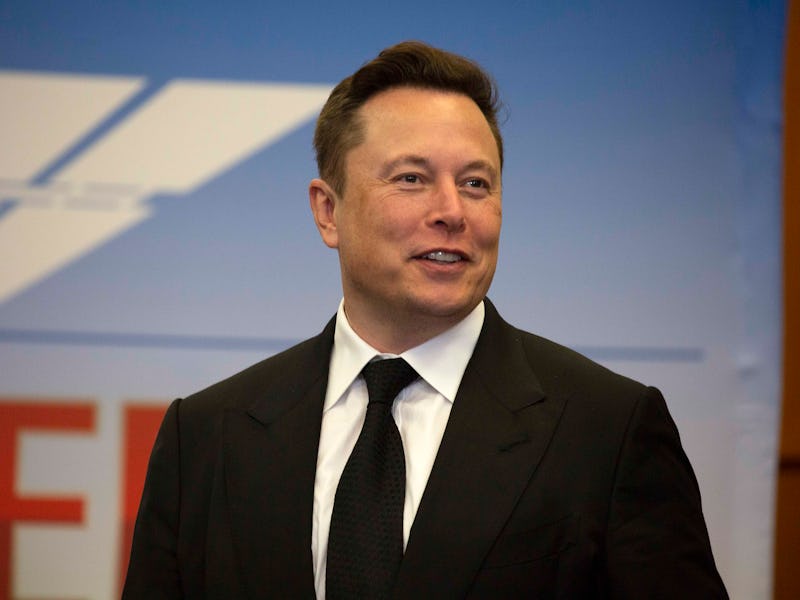Tesla's latest product perfectly captures how Elon Musk uses the internet
The company's latest merchandise highlights its CEO's link with internet communities.

Tesla has released its latest product, and it's emblematic of its CEO's approach toward internet culture.
On Sunday, Elon Musk announced via his Twitter page that the company's "short shorts" were now on sale. The shorts have it all. There's a price tag of $69.420, two numbers that reference internet memes about sex and weed respectively. It has "S3XY" emblazoned on the rear, a reference to the company's current four-car lineup.
The product page even has a description that makes it clear what the product is about:
Celebrate summer with Tesla Short Shorts. Run like the wind or entertain like Liberace with our red satin and gold trim design. Relax poolside or lounge indoors year-round with our limited-edition Tesla Short Shorts, featuring our signature Tesla logo in front with “S3XY” across the back. Enjoy exceptional comfort from the closing bell.
The "short shorts" are an elaborate reference to short sellers, stock market investors that have placed bets against Tesla's stock price increasing.
It seems like an off-the-wall way to criticize these positions, but this is standard fare for Musk. This is the CEO that sold flamethrowers based on a Spaceballs reference, declared he was "capping" sales of The Boring Company hats, and whose firm Tesla added a Mario Kart reference to its vehicles.
Musk regularly chats with some of his 36.6 million Twitter followers, eschewing stuffy corporate-speak in favor of sharing memes that can sometimes feel impenetrable to people that aren't "extremely online." Like a long-running TV show – Musk joined Twitter in June 2009, growing more active sometime in 2015 – Musk's Twitter page has built up in-jokes and references to previous posts.
The front of Tesla's newest product.
The backside of Tesla's newest product, which contains references to various car models.
Considering how he's added an extra five million followers in the past four months alone, it seems to be a popular approach. And while other CEOs post on Twitter with key company-aligned messages and the occasional response to a fan, Musk seems almost unique in terms of the levels of his engagement.
Short sellers are another long-standing theme for his page. Musk has rallied against these investors for years. In a May 2018 earnings call, he cut off one analyst for asking a "boneheaded" question, an analyst he claimed was a short seller. In June 2018 he named short sellers as among the people that "want Tesla to die."
One anonymous critic of the company and a short seller, "Montana Skeptic," quit writing in July 2018 after they claimed Musk contacted their place of work. Electrek reported that the writer was an investment manager with ties to the oil industry. Oil and gas companies were also listed in Musk's June 2018 letter as among those that wanted the company to "die."
The short seller has become a favorite punching bag on Musk's Twitter page. In April 2017, Musk posted that there was "stormy weather in shortville." In June 2018 he asked "who likes short shorts" accompanied by a link to the Royal Teens song of the same name.
A few days later he wrote that he'd send Greenlight Capital president David Einhorn "a box of short shorts" after Einhorn said he was giving back his Tesla Model S. A few days after that, Musk declared that short shorts would be "coming soon to Tesla merch." With this weekend's product release, Musk has made good on a promise from two years ago.
It's not the first time that a seemingly small joke has turned into a real initiative from one of Musk's firms. Even The Boring Company, Musk's tunnel-digging firm, appeared to emerge from offhand frustration with Los Angeles traffic in December 2016. The firm's branded flamethrower, which started reaching buyers in the summer of 2018, was described by Musk as a product inspired by Spaceballs – a movie where the character Yogurt breaks the fourth wall to declare the film makes money off of merchandise.
Musk's free-flowing Twitter posts haven't always been consequence-free. He described cave rescue hero Vernon Unsworth as a "pedo guy" in July 2018, leading to Unsworth taking legal action against Musk. His August 2018 tweet to promise to take Tesla private at $420 per share led to action from the Securities and Exchange Commission. This year, Musk used his account to cast doubt on government action taken during the coronavirus pandemic.
As a novelty product, the short shorts seem to form part of a rather niche reference. But as anyone that's followed Musk for long enough knows, it's part of the CEO's ongoing unique – and at times controversial – approach to community engagement.